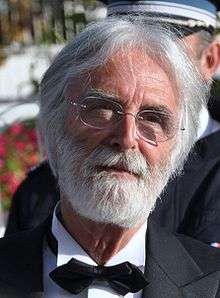Michael Haneke
Michael Haneke (German: [ˈhaːnəkə]; born 23 March 1942) is an Austrian film director and screenwriter. His work often examines social issues and depicts the feelings of estrangement experienced by individuals in modern society.[1] Haneke has made films in French, German, and English and has worked in television‚ theatre, and cinema. He also teaches film direction at the Film Academy Vienna.
Michael Haneke | |
|---|---|
 Haneke at the 2009 Cannes Film Festival | |
| Born | 23 March 1942 Munich, Germany |
| Nationality | Austrian |
| Occupation | Film director, screenwriter |
| Spouse(s) | Susanne Haneke ( m. 1983) |
His directorial debut, The Seventh Continent, won the Bronze Leopard at the Locarno International Film Festival in 1989. He later won the Grand Prix at the 2001 Cannes Film Festival for The Piano Teacher and the Best Director Award for Caché at the 2005 Cannes Film Festival. He subsequently directed the 2007 remake of his controversial 1997 film Funny Games.
At the 2009 Cannes Film Festival, his film The White Ribbon won the Palme d'Or, and at the 67th Golden Globe Awards the film won the Golden Globe Award for Best Foreign Language Film. In 2012, his film Amour premiered and competed at the 2012 Cannes Film Festival. The film would go on to win the Palme d'Or, making it his second win of the prestigious award in three years; this made him the seventh director (at the time) to have won it twice and the only Austrian director to have accomplished this.[2] The film received five Academy Award nominations, including Best Picture, Best Director, Best Original Screenplay, and Best Actress in a Leading Role for Emmanuelle Riva; it won in the category of Best Foreign Language Film.
In 2013, Haneke won the Prince of Asturias Award for the arts. His twelfth and most recent film, Happy End, was nominated for the Palme d'Or at the 2017 Cannes Film Festival.
Life and career
Haneke was born in Munich, Germany, the son of German actor and director Fritz Haneke and Austrian actress Beatrix von Degenschild. His stepfather, the composer Alexander Steinbrecher, had later married the mother of actor Christoph Waltz.[3] Haneke was raised in the city of Wiener Neustadt, Austria.
Haneke showed a strong interest in Literature and Music, but as an adolescent devolped a "downright contempt for any form of school".[4] During this period of his life, he has later described himself as a "rebel". He had ambitions of becoming an actor in his youth, later abandoning these plans after failing an entrance examination at the Max Reinhardt Seminar in Vienna.[5] He later attended the University of Vienna to study philosophy, psychology and drama. Not a committed student, he would spend most of his time attending local movie theatres.[6] After leaving university, he began working odd jobs, before working as an editor and dramaturge at the southwestern German television station Südwestfunk from 1967 to 1970. A time, during which he also worked as a film critic. He made his debut as a television director in 1974.
Haneke's feature film debut was 1989's The Seventh Continent, which served to trace out the violent and bold style that would bloom in later years. Three years later, the controversial Benny's Video put Haneke's name on the map. Haneke achieved great success in 2001 with the critically successful French film The Piano Teacher. It won the prestigious Grand Prize at the 2001 Cannes Film Festival and also won its stars, Benoît Magimel and Isabelle Huppert, the Best Actor and Actress awards. He has worked with Juliette Binoche (Code Unknown in 2000 and Caché in 2005), after she expressed interest in working with him.[7] Haneke frequently worked with real-life couple Ulrich Mühe and Susanne Lothar – thrice each.
His film, The White Ribbon, premiered at the 2009 Cannes Film Festival and won the Palme d'Or. The film is set in 1913 and deals with strange incidents in a small town in Northern Germany, depicting an authoritarian, fascist-like atmosphere, where children are subjected to rigid rules and suffer harsh punishments, and where strange deaths occur. In 2012, his film Amour also won the Palme d'Or.
Haneke says that films should offer viewers more space for imagination and self-reflection. Films that have too much detail and moral clarity, Haneke says, are used for mindless consumption by their viewers.[8]
His 2012 film Amour won the Best Foreign Language Oscar and was nominated for the Best Picture Oscar at the 85th Academy Awards.[9] In 2013, he was the subject of the documentary film Michael H – Profession: Director.[10][11] That year, Haneke won the Prince of Asturias Award for the arts.
In 2017, his twelfth film, Happy End, was nominated for the Palme d'Or at the 70th Cannes Film Festival.
Stage work
Haneke has directed a number of stage productions in German, which include works by Strindberg, Goethe, and Heinrich von Kleist in Berlin, Munich and Vienna. In 2006 he gave his debut as an opera director, staging Mozart's Don Giovanni for the Opéra National de Paris at Palais Garnier when the theater's general manager was Gerard Mortier. In 2012, he was to direct Così fan tutte for the New York City Opera.[12] This production had originally been commissioned by Jürgen Flimm for the Salzburg Festival 2009, but Haneke had to resign due to an illness preventing him from preparing the work. Haneke realized this production at Madrid's Teatro Real in 2013.[13]
Quotes
- "My films are intended as polemical statements against the American 'barrel down' cinema and its dis-empowerment of the spectator. They are an appeal for a cinema of insistent questions instead of false (because too quick) answers, for clarifying distance in place of violating closeness, for provocation and dialogue instead of consumption and consensus."
- —From "Film as catharsis".[14]
- "Pornography, it seems to me, is no different from war films or propaganda films in that it tries to make the visceral, horrific, or transgressive elements of life consumable. Propaganda is far more pornographic than a home video of two people fucking."[15]
- "Film is 24 lies per second at the service of truth, or at the service of the attempt to find the truth."[16]
- "My favourite film-maker of the decade is Abbas Kiarostami. He achieves a simplicity that's so difficult to attain."[17]
- "I do think that our perception of reality is fragmentary, and in 20th-century literature, it's totally normal to not describe reality as something whole and completely transportable and explicable. That's been accepted in novels. But genre films always pretend that reality is transportable, which means that it is explicable."[18]
- "Consider the pigeon just a pigeon...There are lots of pigeons in Paris."
- —On the meaning of pigeons in his movies[19]
Filmography
Feature films
TV films
- ...Und was kommt danach? (After Liverpool, 1974) — (based on a play by James Saunders)
- Drei Wege zum See (Three Paths to the Lake, 1976) — (based on a story by Ingeborg Bachmann)
- Sperrmüll (Household Rubbish, 1976)
- Lemminge, Teil 1: Arkadien (Lemmings, Part 1: Arcadia, 1979)
- Lemminge, Teil 2: Verletzungen (Lemmings, Part 2: Injuries, 1979)
- Variation (1983)
- Wer war Edgar Allan? (Who Was Edgar Allan?, 1984) — (based on a novel by Peter Rosei)
- Fraulein (Miss, 1986)
- Nachruf für einen Mörder (Obituary for a Murderer, 1991)
- Die Rebellion (The Rebellion, 1992) — (based on Rebellion by Joseph Roth)
- Das Schloß (The Castle, 1997) — (based on The Castle by Franz Kafka)
Short films
- Lumière and Company (1995) (segment "Michael Haneke/Vienne")
Bibliography
- Catherine Wheatley: Michael Haneke's Cinema: The Ethic of the Image, New York: Berghahn Books, 2009, ISBN 1-84545-722-6 review
- Michael Haneke. Special Issue of Modern Austrian Literature. 43.2, 2010.
- Alexander D. Ornella / Stefanie Knauss (ed.): Fascinatingly Disturbing. Interdisciplinary Perspectives on Michael Haneke's Cinema, Eugene, Pickwick, 2010, ISBN 978-1-606-08624-7.
References
- Wray, John (23 September 2007). "Minister of Fear". The New York Times Magazine. Retrieved 21 August 2007.
Making waves, however, is what Haneke has become famous for. Over the last two decades, the director has developed a reputation for stark, often brutal films that place the viewer – sometimes subtly, sometimes explicitly – in the uncomfortable role of accomplice to the crimes playing out on-screen. This approach has made Haneke one of contemporary cinema's most reviled and revered figures, earning him everything from accusations of obscenity to a retrospective at the Museum of Modern Art. Funny Games, the movie Haneke was shooting in New York and Long Island, is the American remake of a highly controversial film by the same name that he directed in 1997.
- "Awards 2012". Cannes Festival. Retrieved 27 May 2012.
- In his second marriage, the composer Alexander Steinbrecher was married to Degenschild. After her death he married Elisabeth Urbancic, the mother of Waltz. So Steinbrecher is the stepfather of both Haneke and Waltz.
- "Haneke über Haneke" (PDF).
- Rouyer, Cieutat, Phillippe, Michel (2013). Haneke par Haneke. France: Alexander. pp. 17, 18, 22, 24, 28, 29. ISBN 978-3895812972.
- "Interview with Michael Haneke". YouTube.
- "Sight & Sound | Code Unknown (2000)". BFI. 8 July 2010. Archived from the original on 3 August 2012. Retrieved 22 January 2014.
- "Michael Haneke Interviewed by Alexander Kluge – News und Stories (eng subtitles by dctp)". ProSiebenSat.1 Media. 23 June 2008. Retrieved 28 May 2012.
- "Oscars: Hollywood announces 85th Academy Award nominations". BBC News. 10 January 2013. Retrieved 10 January 2013.
- Bradshaw, Peter (14 March 2013). "Michael H – Profession: Director". The Guardian. London. Retrieved 15 March 2013.
- "Michael H., Profession: Director". Timeout. Retrieved 15 March 2013.
- "Opera News > The Met Opera Guild". Metoperafamily.org. Retrieved 20 September 2011.
- "Giving Così fan tutte a Little Extra Gravity" by George Loomis, The New York Times, 5 March 2013
- Haneke, Michael – "Film als Katharsis": in Austria (in)felix: zum österreichischem Film der 80er Jahre – Bono, Francesco (ed.), 1992. ISBN 3-901272-00-3
- Christopher Sharrett. "Austrian film: Michael Haneke interviewed". Kinoeye. Retrieved 20 September 2011.
- Ignoramous, Lamos. "Watch "24 Realities Per Second" Michael Haneke Documentary". FilmsLie.com. Retrieved 10 August 2016.
- Lewy, Ruth (7 November 2009). "Michael Haneke Its super to be number one". The Times. London. Retrieved 12 May 2010.
- Lawrence, Chua. "Michael Haneke", BOMB Magazine, Summer, 2002. Retrieved 29 July 2011.
- "Michael Haneke talks about Amour Archived 16 January 2014 at the Wayback Machine, interview by Karin Schiefer, Austrian Film Commission, May 2012
External links
| Wikiquote has quotations related to: Michael Haneke |

- Michael Haneke on IMDb
- Luisa Zielinski (Winter 2014). "Michael Haneke, The Art of Screenwriting No. 5". Paris Review.
